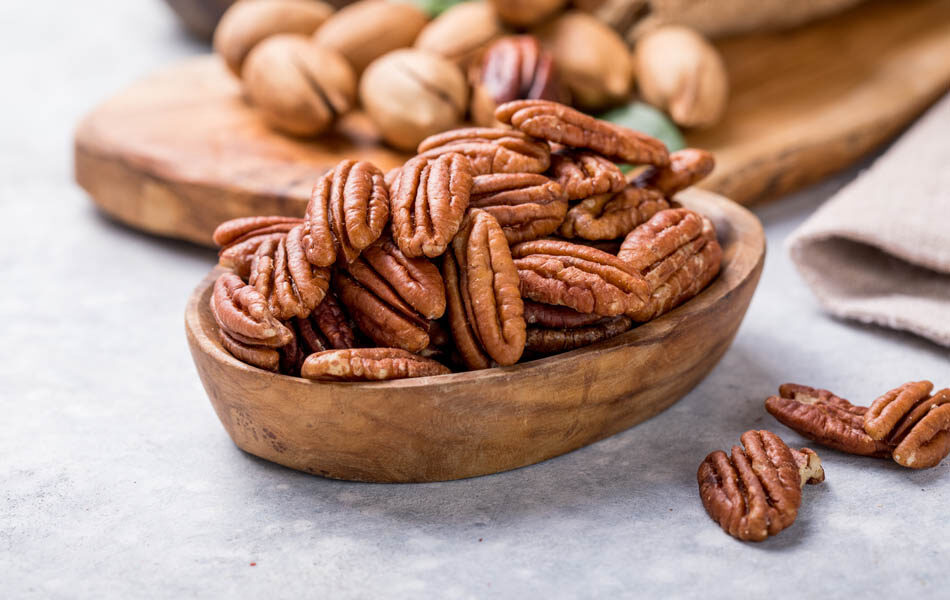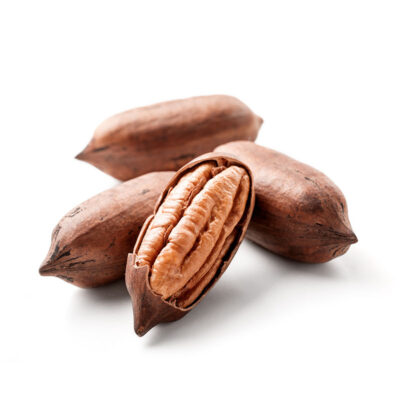Are Pecans Good for Diabetes? Glycemic Index and Benefits
Most tree nuts are associated with reduced disease risk. Consuming nuts regularly improves overall health, and this article evaluates the nutritional value and health benefits of pecans for diabetes.

When contemplating a diabetes-friendly snack, it is hard to rule out nuts. Nuts are widely known for their nutrient-dense profile and wide range of health benefits. Among such nuts are pecans.
Pecans are rich in monounsaturated and cholesterol-free fats, making them a great food for improving overall health. However, are pecans good for diabetes?
We often hear about walnuts, almonds, and even pistachios and how they improve our nutrition. This article, however, discusses pecans’ nutritional profile, health benefits, and whether they are good for people with diabetes.
Are Pecans Good for Diabetes?
Pecans help slow down the body’s carbohydrate absorption, making them diabetes-friendly. They are a good fiber source and rich in phytochemicals that help manage blood glucose levels.
You can surely add pecans to your meal plan as they have a low glycemic index and help in blood glucose control among people with type 2 diabetes. Eating nuts regularly also minimizes the effects of higher glycemic foods when incorporated into the same meal.
Do Pecans Raise Blood Sugar?
Eating pecans does not raise blood sugar levels as they have a very low glycemic index. However, it is best to consume dry-roasted unsalted pecans to avoid blood sugar spikes.
The monounsaturated and polyunsaturated fats in pecans also help in blood sugar control by lowering “bad” LDL cholesterol levels and improving “good” HDL cholesterol levels.
Researchers found that diabetes patients have a 17% lower chance of contracting a cardiovascular disease or heart attack if they consume at least five servings of nuts weekly.
Pecans also have high fiber content, giving you a satiety feeling; hence, you won’t need to eat too much food to satisfy your cravings. This helps keep blood sugar levels in check.
Nutritional Value of Pecans
Pecans are a healthy snack rich in minerals, vitamins, and other important nutrients for improving overall health. 100g of pecans contain:

Pecans also contain essential minerals such as iron, calcium, phosphorus, potassium, zinc, and copper, as well as essential B group vitamins and vitamins C, D, E, and K.
Glycemic index of pecans
Pecans are considered a low glycemic index food as they have a glycemic index of 10. Scientific literature shows that low-glycemic foods have favorable health effects such as weight loss, improving blood pressure, and managing blood glucose levels.
How to Eat Pecans for Diabetes?
Pecans are a healthy snack, and for diabetes patients, it is best to eat unsalted and dry roasted or raw pecans. They are available salted or unsalted, roasted or raw, and unshelled or shelled. When purchasing them, it is best to opt for shelled, raw pecans free from wormholes and damage.
It is also advisable to avoid candied or most pre-packaged store-bought pecan varieties that have high sugar and fat content, which leads to spikes in blood sugar levels.
Since pecan nuts are free of sodium and cholesterol, they are a good addition to a diabetes diet and can help manage blood sugar levels. However, though they have an impressive nutritional profile, it is best to eat them in moderation as they are calorie-dense.
5 Stunning Benefits of Pecans for Diabetes
Though little is known about this tree nut, it is a nutritional powerhouse with numerous benefits. Below are some of the associated health benefits of pecan consumption for people with diabetes.
#1 Improves cardiovascular health
Pecan nuts are rich in monounsaturated fats, which are good for improving cardiovascular health and glycemic control. Peer-reviewed studies show that increased nut consumption reduces the risk of contracting cancer, cardiovascular disease, infections, and diabetes.
Since they are a good source of magnesium and calcium, they are good for lowering blood pressure, improving heart health, and managing diabetes.
A study published on 204 people with coronary heart disease showed that eating an ounce of pecan nuts daily helped significantly lower LDL cholesterol levels and triglycerides and minimized the risk of developing diabetes compared to the group that didn’t consume any nuts.
Eating a small handful of pecans daily helps improve lipid profiles, thus improving heart health. A randomized controlled trial comparing the effects of a balanced diet without nuts and a pecan-rich diet showed improved insulin resistance, beta-cell function, and reduced cardiometabolic disease risk.
#2 Prevents gallstones
Pecans contain healthy fats, fiber, and plant sterols (compounds that inhibit your body from absorbing cholesterol). This helps protect the body against gallstones.
A cohort study of nut consumption among men who frequently consumed nuts had a 30% lesser risk of contracting gallstones compared to those who did not consume nuts.
Pecans contain minerals, vitamins, and antioxidants that help prevent gallbladder disease and rid the body of toxins. Highly processed foods increase oxidative stress in the cells, which causes cell damage.
They are also a good source of protein essential for repairing muscle tissue. Though dairy and red meat are good protein sources, they may be high in saturated fat, which stresses the gallbladder. Pecans are a low-fat protein food. So, people who consume them regularly have a reduced risk of having gallstones.
#3 Stabilizes bad/good cholesterol levels
Eating pecans helps stabilize cholesterol levels as they are rich in magnesium and potassium and contain fiber. Pecans have antioxidant properties and contain protein, zinc, and monounsaturated fat, which helps lower blood lipid levels minimizing LDL cholesterol and cardiovascular disease risk.
Pecans are among diabetes superfoods, and a study on 19 adults who regularly consumed 2.5 ounces of pecans daily showed that they had significantly lower bad cholesterol levels and a lower risk of contracting heart disease compared to those who did not consume any pecans.
It also helped improve serum insulin, making it good for type 2 diabetes management and helping lower the risk of heart disease.
#4 Rich in fiber
Pecans have a high fiber content necessary for improving digestive health. Studies show that fiber regulates bowel movements, helping lower the risk of colorectal cancer. It also helps eliminate toxins and improve the growth of healthy gut bacteria.
High-fiber foods are more satiating than low-fiber foods, meaning that one is likely to consume fewer calories for the same volume of food.
For diabetes patients, high fiber foods, especially soluble fiber, help slow down food absorption, improving blood sugar levels. A fiber-rich diet is good for minimizing the risk of gestational diabetes.
Studies show that a daily intake of dietary fiber by 10 grams reduces the risk of gestational diabetes by up to 26%.
#5 Source of calcium
Pecans are a nutrient powerhouse with minerals such as calcium essential for numerous body functions. Calcium is an essential mineral that improves bone health, nerve function, and heart rhythm.
The body mainly gets calcium from food or through supplementation. New research shows that vitamin D and calcium supplementation improve the metabolic profile of pregnant women with gestational diabetes.
Calcium plays a key role in blood clotting and helps improve the cardiovascular system by strengthening the heart muscle. Some studies link a calcium-rich diet of more than 1,000mg daily to low blood pressure.
Calcium also helps muscle contraction since the body releases it when a nerve is stimulated. This calcium aids in muscular contraction.
A 100g serving of pecans contains 70mg of calcium, accounting for 7% of the RDA (Recommended Dietary Allowance) of 1,000mg.
FAQs
Studies show that eating at least 1.5 ounces of pecans daily among people with diabetes helps improve serum insulin, insulin resistance, and beta-cell function. It also protects at-risk adults from developing cardiovascular disease. Consuming 1.5 ounces of pecans daily also improves insulin resistance, minimizing the risk of contracting type 2 diabetes.
Yes, one 100g serving of pecans contains 3.97g of sugar. However, these nuts are low on the glycemic index and thus improve insulin sensitivity. It is best to avoid processed nuts, which may have a high sugar content and increase blood sugar levels.
Pecans are slightly better than walnuts for a diabetes diet though both are a goldmine for essential nutrients. Pecans contain slightly more dietary fiber, whereas walnuts have more proteins and amino acids. Compared to walnuts, pecans have lesser sodium and a lower glycemic index.
A Word From Our MD
Pecans are rich in vital nutrients like zinc, copper, and magnesium. They are associated with numerous benefits such as boosting brain health, diabetes management, blood sugar control, and improving heart health.
A pecan-rich diet improves insulin sensitivity among at-risk adults and reduces heart disease risk. You can enjoy them in moderation as part of a balanced weight loss diet. It is best to stick to the recommended daily intake as it is a calorie-dense food and might contribute to weight gain.
High-calorie foods affect beta cell function and worsen insulin resistance. Eating pecan nuts, however, helps protect adults with a history of gestational diabetes or a risk of type 2 diabetes.
Though most people can consume pecan nuts safely without side effects, this is not universal as some people experience nut allergies. Pecan allergies include dizziness, shortness of breath, and tongue swelling.
For diabetes patients, it is best to avoid high-carb foods to keep blood sugars in check. It is advisable to consult a licensed healthcare practitioner before making any changes to your diet.
Conclusion
Pecan nuts are a diverse superfood you can easily incorporate into your daily meal plan for diabetes management. They are rich in fiber content, vitamins, and nutrients, and you can incorporate them in moderation as a part of a balanced diet.
They contain vitamin E, potassium, calcium, and folic acid, and a handful daily gives you the daily dose of some of the recommended nutrients necessary for healthy body function.
Nonetheless, it is best to contact your doctor before making any changes to your diet.

















































 Select your language:
Select your language: 








